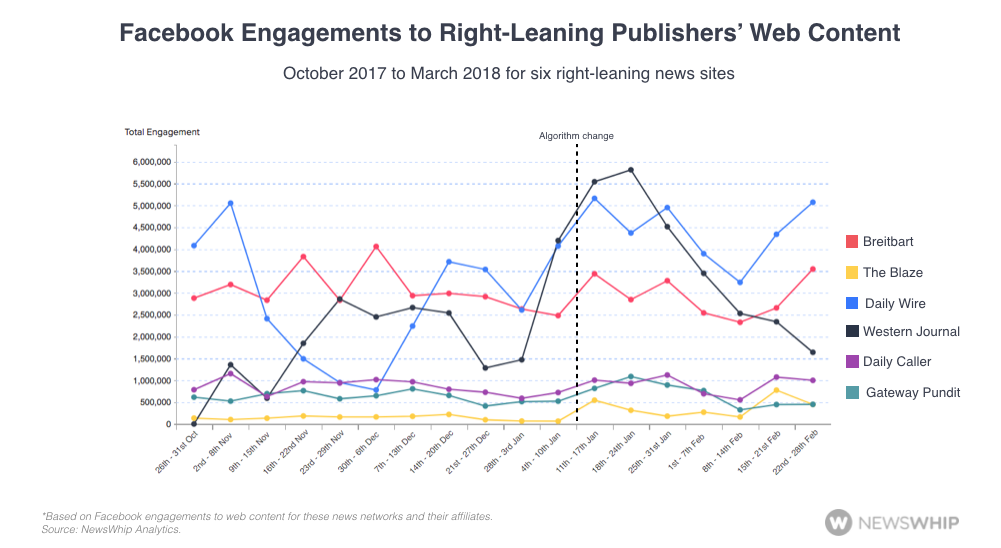
The growing stream of reporting on and data about fake news, misinformation, partisan content, and news literacy is hard to keep up with. This weekly roundup offers the highlights of what you might have missed.
An ongoing engagement. It seems as if Facebook’s algorithm changes — which deprioritize publisher content in News Feed in favor of content from family and friends, and are supposed to favor trusted news sources over untrusted ones — would result in decreased traffic for hyperpartisan sites. But so far, data provided to Nieman Lab by NewsWhip suggests, hyperpartisan sites — as well as two totally-just-fake-news sites — are doing as well or better on Facebook, at least when it comes to engagement, as they were before the changes.
To be sure, conservative sites like Breitbart, The Blaze, and Gateway Pundit say the changes are hurting their traffic. They suggest, moreover, that changes are disproportionate compared to those experienced by liberal sites.
“Liberal publishers have gained about 2 percent more web traffic from Facebook than they were getting prior to the algorithm changes implemented in early February,” George Upper wrote for rightwing site The Western Journal, citing data he collected from SimilarWeb. “On the other hand, conservative publishers have lost an average of nearly 14 percent of their traffic from Facebook.” (Note: Western Journal categorized publishers as conservative or liberal based on the rankings from Media Bias/Fact Check, a site that is not associated with any larger organization; it’s run by a man named Dave Van Zandt, who says he’s spent “more than 20 years as an arm chair researcher on media bias and its role in political influence.”)
It makes intuitive sense that hyperpartisan sites would suffer under the algorithm changes. But you’ll forgive me for not believing that Facebook was going to do the intuitive thing here. This also didn’t seem to fit with data that NewsWhip recently released about the top individual reporters on Facebook; it showed that reporters from right-wing outlets are still doing really well on Facebook, much better than reporters from mainstream or left-leaning outlets.


NewsWhip also said in its new report that Your Newswire, a straight-up fake news site, had the 26th-most-viewed story (“CDC Doctor: ‘Disastrous’ Flu Shot Is Causing Deadly Flu Outbreak”) after the algorithm change. (Fact check: false.)
So I asked NewsWhip to break out the performance of the hyperpartisan outlets that appeared on its top-reporters list, pre-and post-algorithm changes. I also asked them to check on a couple of left-leaning sites — Daily Kos and Raw Story — even though those sites didn’t appear on NewsWhip’s most-popular sites, and NewsWhip threw in three left-leaning sites as well: Opposition Report, Think Progress, and Talking Points Memo. (For the record, I don’t think Talking Points Memo really belongs in this category.) On the right, I asked them to check Daily Wire, Daily Caller, Breitbart, Gateway Pundit, Western Journal, and The Blaze. I also asked them to look at engagement on the two fake-news sites that made their “top reporters” list: Your Newswire and Neon Nettle. Here’s what they found about engagement (which they define as likes, shares, reactions, and comments) on these sites pre- and post-algorithm change.



Couple things:
— Note the Y-axes on the charts; the conservative sites get much, much more engagement than the sites on the left.
— So far, the sites do not show clear patterns of changes in engagement pre- or post-algorithm change. Engagements aren’t the same thing as traffic, but they’re a pretty good proxy for it.
— Maybe there will be more changes over the next few months. So far, though, the changes do not seem catastrophic to hyperpartisan sites, and it seems too early to conclude that conservative sites have been singled out.
— Breitbart’s traffic has reportedly dropped a lot, but likely for reasons other than the algorithm change.
— The NewsWhip data appears to contradict a report published by The Outline that used BuzzSumo (a NewsWhip competitor) data to suggest that conservative sites had seen a particularly big decrease following the Facebook algorithm changes. The Outline said that Fox News experienced a “serious dip” in January, for instance, but NewsWhip’s data shows the opposite.
“None of us can turn back the clock. On Thursday, Facebook held a conference call with some journalists about its “ongoing election efforts.” A transcript is here. Mashable’s Kerry Flynn also live-tweeted it.
Main gist of that is Facebook isn't coming up with one solution, they're saying they need to localize their effort to particular countries / regions
— Kerry Flynn 🐶 (@kerrymflynn) March 29, 2018
Facebook’s third-party fact-checkers are now fact-checking photos and videos, “starting in France with the AFP and will be scaling to more countries and partners soon.” This was something the fact-checkers had wanted. In Italy and Mexico, meanwhile, “we enabled fact-checking partners to proactively identify and rate stories, ensuring we could take action quickly in the run-up to their elections,” rather than waiting for the stories to be tagged by users.